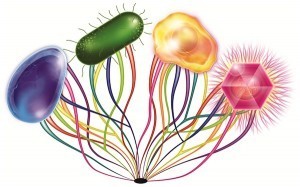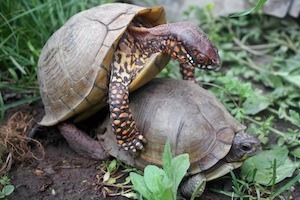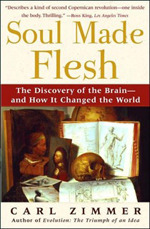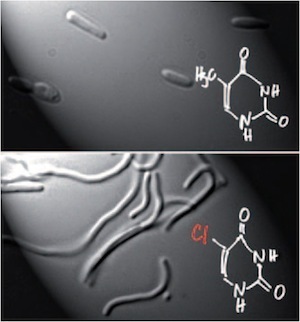Carl Zimmer's Blog, page 60
July 21, 2011
Brain Cuttings Kindle: On mysterious sale for $3.99
 Amazon has put my ebook, Brain Cuttings: Fifteen Journeys Through the Mind on sale for the gotta-get-it price of $3.99. If you want some information on the ebook, check out…
Amazon has put my ebook, Brain Cuttings: Fifteen Journeys Through the Mind on sale for the gotta-get-it price of $3.99. If you want some information on the ebook, check out…
The Brain Cuttings page on my web site
A review by Vaughan Bell on his essential blog, Mind Hacks
And if the only information you need is "$3.99," here's where you can get a copy.
(PS–I have no idea why Amazon decided to put the ebook on sale, and have no idea how long the sale will last. So grab it now!)
July 17, 2011
The pleasures of Google+
 Over the past week or so, I've been playing around with Google+, Google's answer to Facebook and Twitter. You can see my posts here.
Over the past week or so, I've been playing around with Google+, Google's answer to Facebook and Twitter. You can see my posts here.
Whenever a new social media system rolls out, I give it a test-drive. Sometimes I end up in a ditch. Here is my MySpace page, last updated three years ago and now lingering on like a time capsule.
Here is my abandoned Quora page. I asked one question: why does Chewbacca used a crossbow instead of–you know–a laser or something more effective?After I got some answers, I lost all interest.
For the most part, though, I try to make social media part of my life. My rational explanation for this is that, as a writer, I ought to head for the virtual spaces where people congregate and look for things to read. Of course, I'm also lured by the addictive procrastination. It sometimes feels like channel-surfing on a social cable television. Whatever the true cause, I've ended up with an author web site (old school!), this blog, a Facebook profile, a Facebook author page, a Twitter account, a Tumblr thing-a-ma-bob, a LinkedIn account…and other things ...

July 14, 2011
Trouble in the Fourth Domain?
 In March I wrote about two studies that raised the tantalizing possibility that the tree of life, which till now has appeared to have three main branches, turns out to have a fourth.
In March I wrote about two studies that raised the tantalizing possibility that the tree of life, which till now has appeared to have three main branches, turns out to have a fourth.
Some of the evidence for the fourth branch (or "domain," as taxonomists would call it) came from a newly discovered and very strange group of viruses. They're known as giant viruses, because they're about a hundred times bigger than typical viruses and can have over a thousand genes. If there was indeed a fourth domain , it meant that giant viruses were part of one of the oldest lineages on Earth. By studying them we might learn about the earliest stages in life's evolution.
Since then, there have been a couple developments that merit a follow-up. In April, Didier Raoult of Mediterranean University in Marseille and his colleagues published a new study on another species of giant virus. Their previous studies on the fourth domain involved giant viruses that were first discovered in the water in air conditioners, infecting amoebae called Acanthamoeba. But now scientists are finding giant viruses all over the world, in lots of ...

July 8, 2011
The Final Stage of Madness: The Ultimate Autographed Book Clearance Sale
 Thanks to everyone who has been taking my extra books off my hands in advance of a summer of house-gutting. If you've been holding out, or if you've been thinking about getting another book, your moment has come. Apparently, some brain-infecting parasite has taken such a grievous toll on my Economic Cortex that I now find myself offering you this final, ridiculous sale to end all sales. All the remaining autographed hardback books in my Amazon store are now ten dollars. All autographed paperback books are five dollars.
Thanks to everyone who has been taking my extra books off my hands in advance of a summer of house-gutting. If you've been holding out, or if you've been thinking about getting another book, your moment has come. Apparently, some brain-infecting parasite has taken such a grievous toll on my Economic Cortex that I now find myself offering you this final, ridiculous sale to end all sales. All the remaining autographed hardback books in my Amazon store are now ten dollars. All autographed paperback books are five dollars.
Let me break it down for you. Click on the links below to order your copies:
Parasite Rex, US hardback (1 left): $10
Parasite Rex, US paperback (3 left): $5
Parasite Rex, UK paperback (15 left): $5
Microcosm, US paperback (8 left): $5
Soul Made Flesh US paperback (1 left): $5
Soul Made Flesh UK hardback (11 left): $10
Soul Made Flesh UK paperback (11 left): $5
Smithsonian Intimate Guide to Human Origins, US hardback (8 left): $10
Goodbye, E. coli?
Lucas Brouwers, one of the new bloggers at Scientific American's snazzy new blog network, takes a look at an intriguing paper (free pdf). The authors of the paper in examined many different strains of E. coli and come to a remarkable conclusion: they've been splitting apart so far that they may soon no longer be a single species. Check it out. (And, if you have a lot of time to spare, check out the rest of Scientific American's fine line-up of bloggers.)
July 7, 2011
Reverse Engineering John McPhee
 I've never met John McPhee, but he's always been lurking around my office. I've got a number of his books, and I always keep an eye out for his latest piece in the New Yorker. I can't count the number of times reading a few lines of his stuff helped get me revved up again for writing.
I've never met John McPhee, but he's always been lurking around my office. I've got a number of his books, and I always keep an eye out for his latest piece in the New Yorker. I can't count the number of times reading a few lines of his stuff helped get me revved up again for writing.
Recently, Alexis Madrigal of the Atlantic invited me to participate in a Neiman Storyboard series called "Why's This So Good?" Writers pick out a good piece of long-form journalism and try to figure out what makes it so. Having just revisited out McPhee's sprawling 1987 epic on engineering the Mississippi, "Atchafalaya," I chose it for my object of study. Here's my take. And, if you have a free moment to quaff 28,000 words, here's McPhee's piece.
Why is there sex? To fight the parasite army
 For several decades now, biologists have been puzzling over sex. In some ways, it seems like a huge waste of effort.
For several decades now, biologists have been puzzling over sex. In some ways, it seems like a huge waste of effort.
Sexual reproduction requires splitting a species into two sexes, only one of which will be able to produce offspring. There are some species of animals that do without males; the females simply trigger their eggs to develop into embryos without any need for sperm. All the offspring of an asexual animal can produce offspring of their own, instead of just half. So it would make sense that genes that gave rise to asexual reproduction would win out in the evolutionary race.
Clearly that hasn't happened. The world is rife with sex. Animals do it. Plants do it. Even mushrooms do it. So evolutionary biologists have carried out a number of studies to get an answer to the question, "Why sex?"
In 2009, I wrote an essay for Science about this research. If I had been writing that essay today, I'd have focused some attention on an elegant experiment on the sex life of a humble worm. It gives a big boost to the long-floated idea that ...
July 6, 2011
Good morning Wisconsin: On the radio Thursday at 8 am CST
I'm going to talk about viruses on the Joy Cardin show on Wisconsin Public Radio tomorrow (Thursday, July 7) at 8 am CST (9 am EST). Listen here!

Soul-Made-Flesh-A-Thon: A Sale to Clear Out the Brain
 Thanks to everyone who scooped up autographed copies of At the Water's Edge (72 are out the door as of this writing, and 8 are left). My shelves are getting close to being purged of author's copies–which is good, since those shelves are about to come crashing down for some home renovation.
Thanks to everyone who scooped up autographed copies of At the Water's Edge (72 are out the door as of this writing, and 8 are left). My shelves are getting close to being purged of author's copies–which is good, since those shelves are about to come crashing down for some home renovation.
To keep the momentum going, let me offer to you autographed copies of a book I wrote about the origin of neurology in the wild, woolly days of the scientific revolution: Soul Made Flesh. It's a group biography of a seventeenth-century band of big thinkers who put the brain–which was considered by many to be little more than a lump of phlegm–at the center of our existence. At the hub of this circle of virtuosi was the English physician Thomas Wills, a man who's wrongly sunk into oblivion. The story is rich with intrigue, warfare, religious strife, and gorey blood transfusions. (Here's a page with more information about the book at my web site.)
Oliver Sacks switched on my orbitofrontal cortex with a happy glow when he had this to say about the book:
Last year: Arsenic life. This year: Chlorine life?
 Last year, a team of NASA-funded scientists claimed to have found bacteria that could use arsenic to build their DNA, making them unlike any form of life known on Earth. That didn't go over so well. (See my two pieces for Slate for a quick recap: #1, #2.) One unfortunate side-effect of the hullabaloo over arsenic life was that people were distracted from all the other research that's going on these days into weird biochemistry. Derek Lowe, a pharmaceutical chemist who writes the excellent blog In the Pipeline, draws our attention today to one such experiment, in which E. coli is evolving into a chlorine-based form of life.
Last year, a team of NASA-funded scientists claimed to have found bacteria that could use arsenic to build their DNA, making them unlike any form of life known on Earth. That didn't go over so well. (See my two pieces for Slate for a quick recap: #1, #2.) One unfortunate side-effect of the hullabaloo over arsenic life was that people were distracted from all the other research that's going on these days into weird biochemistry. Derek Lowe, a pharmaceutical chemist who writes the excellent blog In the Pipeline, draws our attention today to one such experiment, in which E. coli is evolving into a chlorine-based form of life.
As I wrote in Microcosm, scientists have been contorting E. coli in all sorts of ways for years now to figure out what the limits of life are. Some researchers have rewritten its genetic code, for example, so that its DNA can encode proteins that include amino acids that are not used by any known organism.
Others have been tinkering with the DNA itself. In all living things, DNA is naturally composed of four compounds, adenine, cytosine, guanine, and thymine. ...












